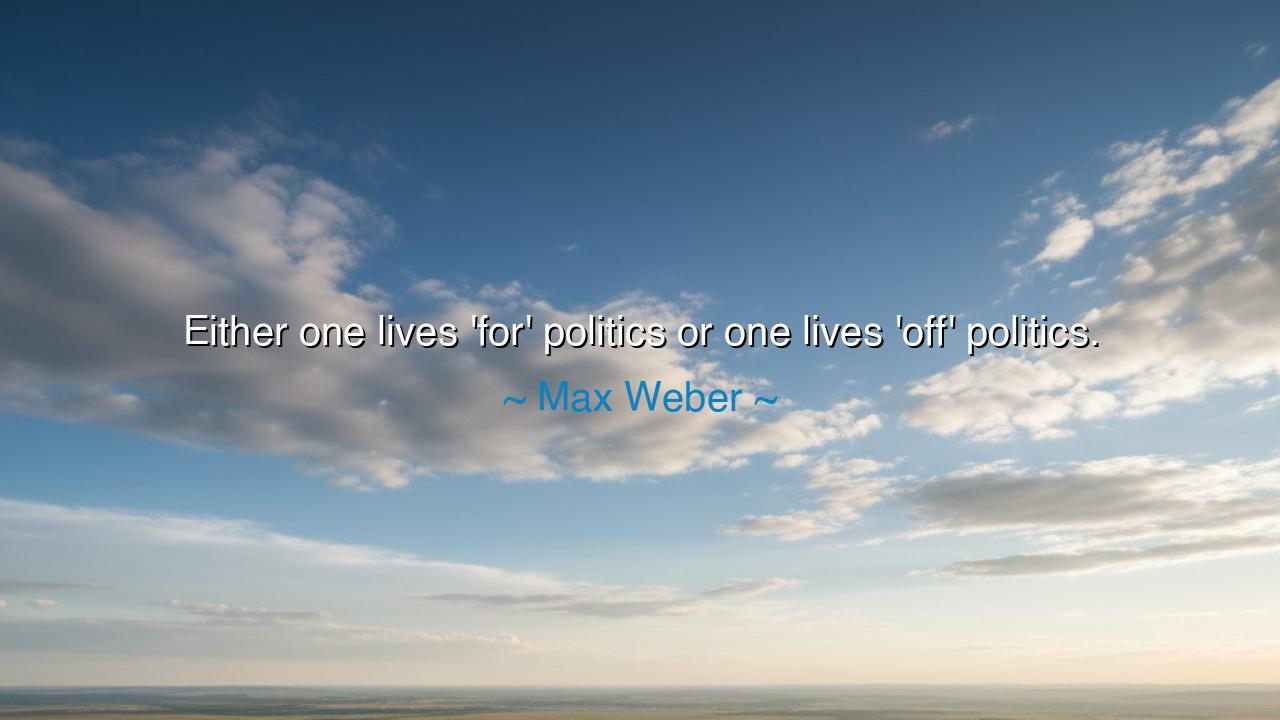
Either one lives 'for' politics or one lives 'off' politics.






The wisdom of Max Weber speaks with the gravity of timeless law: “Either one lives for politics or one lives off politics.” These are not idle words, but a sharp dividing line between those who serve the polis with devotion and those who devour it for gain. To live for politics is to carry a sacred burden, to offer one’s labor and even one’s life for the welfare of the people. But to live off politics is to treat it as a trade, a means of sustenance, a marketplace of favors where power is coin and honor is sold.
In the ancient world, we see both paths. Think of Pericles of Athens, who lived for politics. His vision and oratory lifted the city to greatness, building the Parthenon and shaping an empire of culture and law. He bore office not for his purse, but for his people, and his memory endures like the marble he raised. Yet beside such figures stand others like the demagogues who followed him, who stirred the mob for their own profit, draining the treasury and leaving the city weakened. These men lived off politics, consuming the state as parasites consume the body.
History also gives us the tale of George Washington, who might have been a king but chose instead to step away from power. He lived for politics, not off it, refusing to feast upon the authority he had won. In contrast, many rulers across centuries treated office as spoils—fattening themselves while their people languished. The one path creates republics that endure; the other corrodes them into tyranny and ruin.
Weber’s words are thus both a mirror and a warning. The calling of politics is noble, but it is also perilous, for ambition ever whispers, and the temptation to live off the toil of others is strong. The statesman who forgets that politics is a vocation falls swiftly into corruption, and the commonwealth suffers.
O children of the future, let this teaching burn within you: seek always to live for politics, if politics is your calling. Serve not yourself, but the people. Drink not from the cup of power as though it were your sustenance, but pour it out as an offering for those entrusted to your care. For the polis endures only when leaders rise as guardians, not as merchants of their own advantage.






AAnhpham
Weber’s observation seems to suggest that involvement in politics is a zero-sum game, where people are either actively contributing or passively benefiting. But isn’t there a middle ground? Can’t someone care about social issues, vote, or engage in advocacy without fully committing their lives to politics? In a democracy, should we not all be participating to some degree, even if it’s not our primary focus?
BT39.8.7 Pham Tran Bao Tram
Max Weber’s quote raises an interesting point about the role of politics in people’s lives. For those who live ‘for’ politics, it’s not just a career but a passion, but does that always result in genuine progress or change? On the other hand, those who live ‘off’ politics might benefit from political decisions without contributing to them. How do we reconcile these two extremes in today’s increasingly polarized and politicized world?
HCHa Chung
Weber’s statement feels like it oversimplifies the relationship between individuals and politics. Can’t someone be politically aware without being fully immersed in the day-to-day of politics? What about people who engage in their communities, or who vote, but don’t make politics their primary focus? It seems like there are varying levels of involvement, and this quote doesn’t fully capture the complexities of how people engage with political systems today.
ASAn Song
Max Weber’s quote presents a clear dichotomy in how people engage with politics—either you’re immersed in it, or you benefit from it in some way. But what does it really mean to live ‘for’ politics? Does that mean being constantly active, or is it more about being ideologically engaged? It’s also interesting to think about how those who live ‘off’ politics might still be deeply impacted by political decisions, even if they don’t actively participate.